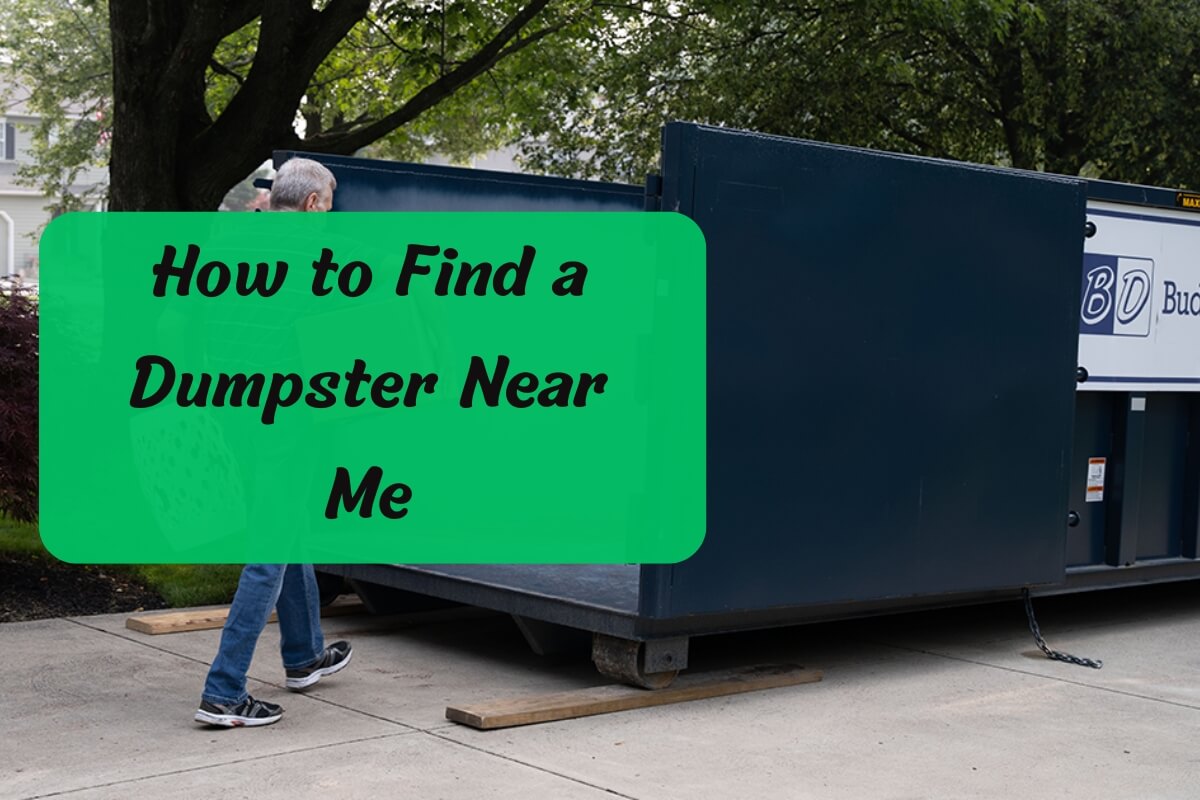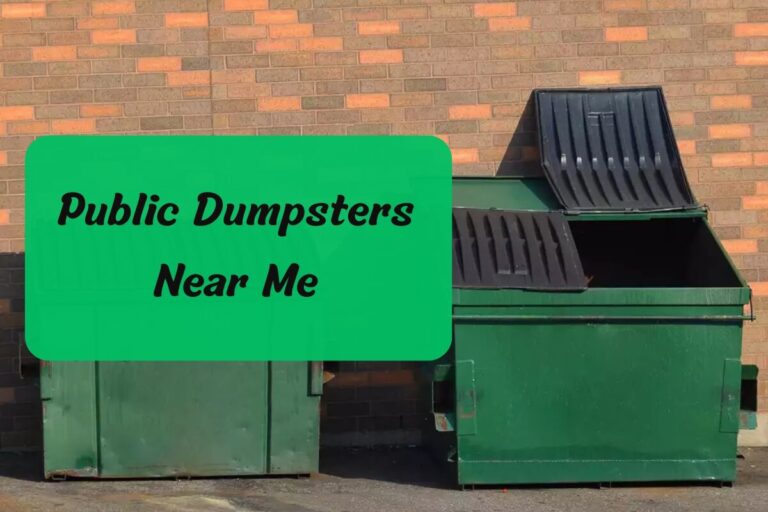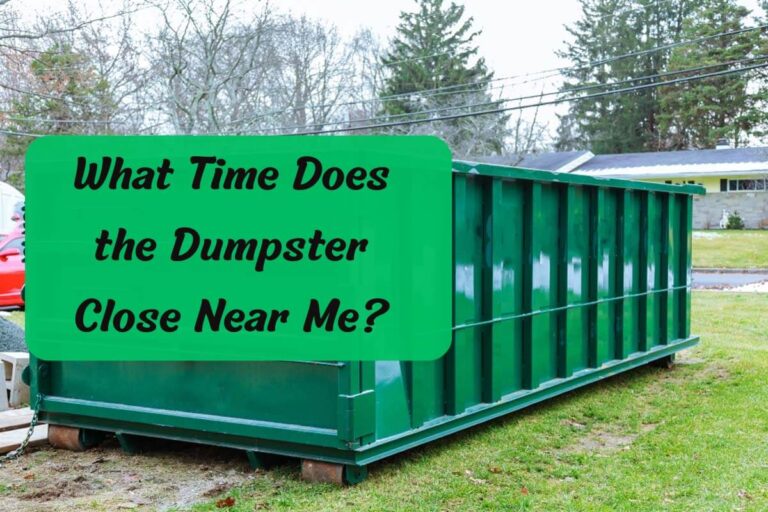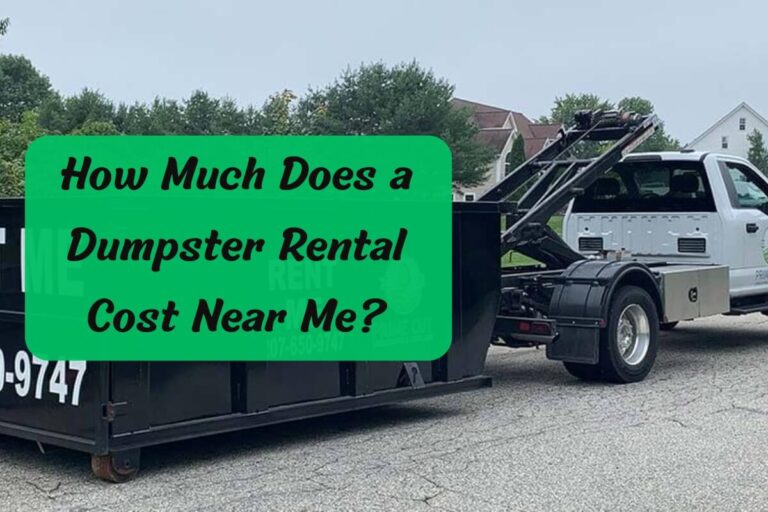
Are you looking to get rid of a large amount of trash, junk or debris? Whether you’re decluttering your home, renovating, or embarking on a construction project, finding a suitable dumpster near you is crucial for proper waste disposal. In this comprehensive guide, we’ll explore various dumpster options available, factors to consider, and tips for sustainable waste management.
The key questions we’ll answer include:
- What are the different types of dumpsters and waste disposal options near me?
- How do I estimate the size of dumpster I need?
- What are the costs associated with renting a dumpster?
- Are there any free or low-cost dumpster alternatives?
- How can I dispose of waste in an eco-friendly manner?
So, let’s dive right in and find the perfect dumpster solution for your needs!
Understanding Your Dumpster Needs
Before you start searching for a dumpster near you, it’s essential to assess your specific requirements. This will help you choose the right dumpster size, type, and disposal method.
Types of Waste to Dispose Of
The first step is to identify the types of waste you need to get rid of. Common items that require dumpster disposal include:
- Yard waste: Branches, leaves, grass clippings, and other green waste.
- Household junk: Old furniture, appliances, electronics, and general clutter.
- Construction debris: Drywall, lumber, concrete, roofing materials, and other building waste.
- Renovation waste: Flooring, cabinets, fixtures, and other materials from home improvement projects.
Some types of waste, like hazardous materials (e.g., paint, chemicals, batteries), have special disposal requirements and are not accepted in regular dumpsters.
Estimating Volume of Waste
Once you’ve identified the types of waste, you’ll need to estimate the volume or cubic yardage required. This will help you determine the appropriate dumpster size. Here are some tips for estimating waste volume:
- Furniture and appliances: Measure the length, width, and height of each item, and use an online calculator to estimate the cubic yardage.
- Construction debris: Count the number of rooms or areas being renovated, and estimate the amount of waste based on the project scope.
- Yard waste: Consider the size of your yard and the amount of trimming or cleaning required.
Remember, it’s better to overestimate your waste volume slightly, as overfilling a dumpster can lead to additional fees or the need to rent another one.
Waste Disposal Restrictions
Before renting a dumpster, it’s crucial to familiarize yourself with any local waste disposal restrictions. Some municipalities have rules regarding the types of materials that can be disposed of in dumpsters, as well as regulations on where dumpsters can be placed (e.g., on public streets or private property).
Additionally, certain items, such as hazardous materials, electronics, and appliances containing refrigerants, may require special handling or disposal methods. Be sure to check with your local authorities or waste management company to ensure you’re following all necessary guidelines.
Free Dumpster Options Near You
While renting a dumpster can be convenient, it’s always worth exploring free or low-cost alternatives, especially if you have a smaller volume of waste or a limited budget.
Residential Curbside Pickup
Many municipalities offer curbside pickup services for large or bulky items, such as furniture, appliances, and yard waste. These services are typically free or included in your regular waste management fees.
To take advantage of curbside pickup, you’ll need to follow your city’s guidelines for proper item preparation and scheduling. This may include:
- Separating different types of waste (e.g., yard waste, appliances, general junk)
- Placing items at the curb on designated pickup days
- Adhering to any size or weight restrictions
Curbside pickup has limits on the amount or types of waste collected at once..
Municipal Recycling/Transfer Stations
Many cities and towns have recycling centers or transfer stations where residents can drop off a variety of waste materials, often free of charge or for a nominal fee. These facilities typically accept:
- Yard waste and green waste
- Household junk and bulk items
- Construction and demolition debris
- Recyclable materials (e.g., paper, plastic, glass, metal)
To use a municipal recycling or transfer station, you’ll need to transport your waste to the facility during their operating hours. Some centers may have size or volume restrictions, so it’s a good idea to call ahead or check their website for specific guidelines.
Charity Donation Centers
Before disposing of items like furniture, appliances, or household goods, consider donating them to a local charity organization. Not only does this help reduce waste, but it also supports a good cause and provides resources to those in need.
Many charities, such as Goodwill, the Salvation Army, and Habitat for Humanity ReStores, accept a wide range of gently used items, including:
- Furniture (e.g., sofas, chairs, tables)
- Appliances (e.g., refrigerators, stoves, washers, and dryers)
- Electronics (e.g., TVs, computers, stereos)
- Home goods (e.g., kitchenware, linens, decor)
Before donating, be sure to check the charity’s guidelines for acceptable items and drop-off procedures. Some organizations may offer free pickup services for larger items or quantities.
Paid Dumpster Rental Services
If free dumpster options aren’t suitable for your needs, renting a dumpster from a professional waste management company may be the best solution. Here are some common paid dumpster rental options to consider.
Roll-Off Dumpster Rental Companies
Roll-off dumpster rental companies are perhaps the most well-known option for larger waste disposal projects. These companies offer various dumpster sizes, typically ranging from 10 to 40 cubic yards, which are delivered and picked up from your location.
Some popular roll-off dumpster rental companies near you may include:
- Waste Management
- Dumpsters.com
- Junk King
- Redbox+
- Bin There Dump That
When renting a roll-off dumpster, consider the following factors:
- Dumpster size: Choose a size that accommodates your waste volume while avoiding overfilling.
- Rental period: Most companies offer daily, weekly, or monthly rental periods, with longer rentals often being more cost-effective.
- Placement: Ensure you have a suitable location for the dumpster, such as a driveway or parking area, and obtain any necessary permits if placing it on public property.
- Accepted materials: Check with the company regarding any restrictions on the types of waste they accept.
Renting a Dumpster Bag
For smaller waste disposal needs, renting a dumpster bag can be a more affordable and convenient option. These heavy-duty bags, typically with a capacity of 3-8 cubic yards, are delivered to your location and picked up once filled.
Dumpster bag rental services are often offered by the same companies that provide roll-off dumpsters, as well as some home improvement stores. Some popular dumpster bag rental options near you may include:
- Bagster
- Junk King Dumpster Bag
- Pop Up Dumpster Bag
Dumpster bags are ideal for projects like small renovations, decluttering, or yard clean-ups, where the waste volume is manageable but too large for regular curbside pickup.
Factors Affecting Dumpster Rental Cost
The cost of renting a dumpster can vary depending on several factors, including:
- Dumpster size: Larger dumpsters typically cost more to rent.
- Rental duration: Longer rental periods often have lower daily rates.
- Location: Rental costs may be higher in certain areas due to demand and transportation fees.
- Disposal fees: Some companies charge additional fees for the weight or volume of waste disposed of.
- Additional services: Services like dumpster relocation or hazardous waste removal may incur extra charges.
To get the most accurate cost estimate, it’s best to contact multiple dumpster rental companies near you and provide details about your project and waste volume. Many companies offer free quotes, allowing you to compare prices and services.
Sustainable Waste Disposal Tips
Finding the right dumpster is crucial, but so is practicing sustainable waste disposal. Reduce, reuse, and recycle to minimize your environmental impact and potentially lower disposal costs.
Reducing Waste at the Source
The best way to reduce waste is to prevent it from accumulating in the first place. Here are some tips for minimizing waste generation:
- Donate or sell unwanted items that are still in good condition, rather than throwing them away. Furniture, appliances, books, and clothing can often be donated to local charities or sold online or through garage sales.
- Compost organic waste, such as food scraps and yard trimmings, to create nutrient-rich soil for your garden or landscaping.
- Buy in bulk and choose products with minimal packaging to reduce waste from containers and wrappings.
- Repair or repurpose items when possible, instead of replacing them with new ones.
- Meal plan and make a grocery list to avoid buying more food than you need, reducing food waste.
Sorting and Recycling
Even after reducing waste at the source, you’ll likely still have some items that need to be disposed of. Properly sorting and recycling these materials can significantly reduce the amount of waste sent to landfills.
- Separate recyclables like paper, plastic, glass, and metal from your regular trash.
- Check local guidelines for accepted recyclable materials and proper preparation (e.g., rinsing containers, removing caps).
- Use designated recycling bins or take your sorted recyclables to a local recycling center.
- Explore special recycling programs for items like electronics, batteries, and household hazardous waste.
By recycling, you not only reduce waste but also conserve natural resources and energy used in manufacturing new products from raw materials.
Choosing Eco-Friendly Disposal Options
When renting a dumpster or using other waste disposal services, consider companies that prioritize environmental responsibility and sustainable practices.
- Look for companies that divert waste from landfills by sorting and recycling materials when possible.
- Inquire about their disposal methods and whether they use environmentally-friendly landfills or waste-to-energy facilities.
- Choose dumpster sizes that match your needs to avoid excess waste and unnecessary transportation emissions.
- Consider renting a dumpster bag or using a local transfer station for smaller waste volumes, as these options may have a lower environmental impact than larger dumpsters.
By choosing eco-friendly disposal options, you can do your part in reducing the environmental impact of waste while still ensuring proper and responsible disposal.
Frequently Asked Questions
Still have questions about finding a dumpster near you? Here are some common queries and their answers:
How do I find dumpster rental companies near me?
You can search online for “dumpster rental near me” or “roll-off dumpster rental [your city/town]” to find local companies. Additionally, check with your municipal waste management department or home improvement stores, as they may offer dumpster rental services or recommendations.
What is the average cost of renting a dumpster?
Dumpster rental costs can vary widely depending on factors like size, rental duration, location, and disposal fees. As a rough estimate, you can expect to pay anywhere from $426 to $857 or more for a typical roll-off dumpster rental.
Can I put anything in a rented dumpster?
Most dumpster rental companies have restrictions on the types of materials they accept, such as hazardous waste, electronics, tires, and certain construction materials. Be sure to check with the company beforehand to avoid additional fees or legal issues.
How long can I keep a rented dumpster?
Rental periods typically range from a few days to a month or more, depending on the company and your needs. Longer rental durations often have lower daily rates, making them more cost-effective for larger projects.
Do I need a permit to place a dumpster on the street?
In many areas, you’ll need to obtain a permit from your local authorities to place a dumpster on a public street or right-of-way. Check with your municipality or the dumpster rental company for specific requirements and fees.
Can I load a dumpster myself, or do I need professional assistance?
Most dumpster rental companies allow you to load the dumpster yourself, but they may offer loading services for an additional fee. Be sure to follow any safety guidelines provided by the company.
Conclusion
Finding a dumpster near you doesn’t have to be a daunting task. By understanding your waste disposal needs, exploring free and paid options, and prioritizing sustainable practices, you can ensure responsible and efficient waste management.
Remember to assess the volume and types of waste you need to dispose of, research local regulations and restrictions, and consider eco-friendly options like recycling and donating. With a little planning and the right dumpster solution, you can tackle your waste disposal project with ease.
Whether you choose curbside pickup, a municipal transfer station, a dumpster rental service, or a combination of these options, the key is to prioritize proper waste disposal to protect the environment and maintain a clean, healthy community.




